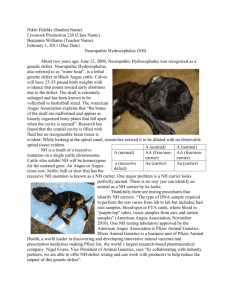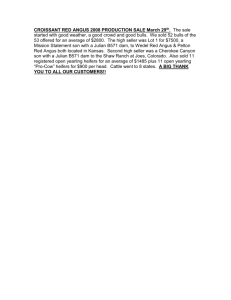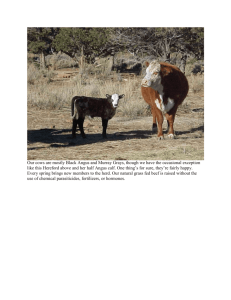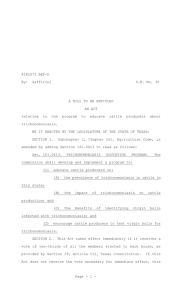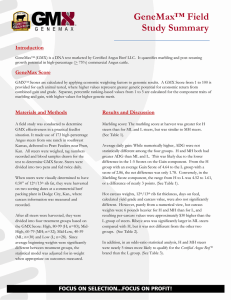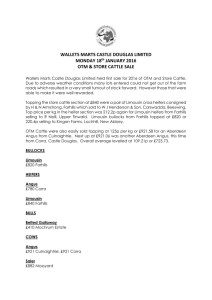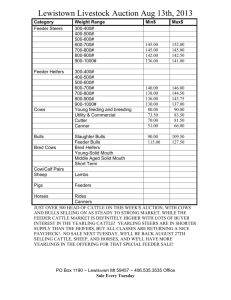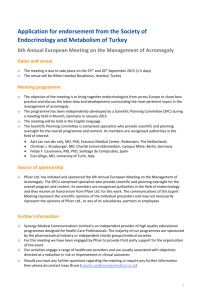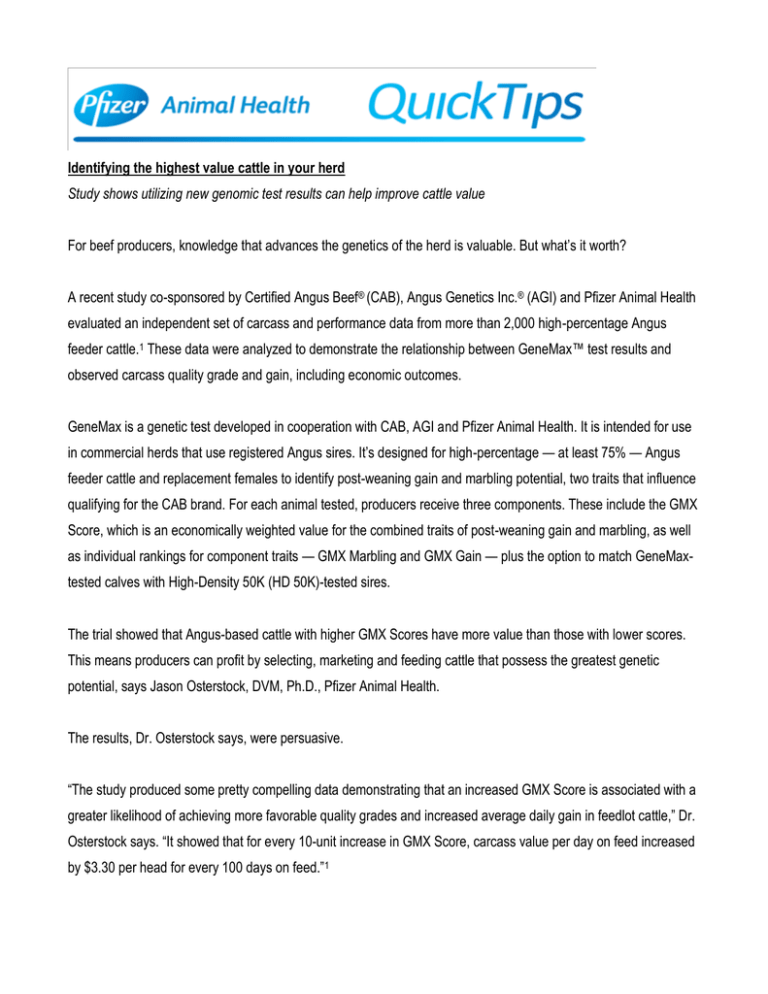
Identifying the highest value cattle in your herd
Study shows utilizing new genomic test results can help improve cattle value
For beef producers, knowledge that advances the genetics of the herd is valuable. But what’s it worth?
A recent study co-sponsored by Certified Angus Beef® (CAB), Angus Genetics Inc.® (AGI) and Pfizer Animal Health
evaluated an independent set of carcass and performance data from more than 2,000 high-percentage Angus
feeder cattle.1 These data were analyzed to demonstrate the relationship between GeneMax™ test results and
observed carcass quality grade and gain, including economic outcomes.
GeneMax is a genetic test developed in cooperation with CAB, AGI and Pfizer Animal Health. It is intended for use
in commercial herds that use registered Angus sires. It’s designed for high-percentage — at least 75% — Angus
feeder cattle and replacement females to identify post-weaning gain and marbling potential, two traits that influence
qualifying for the CAB brand. For each animal tested, producers receive three components. These include the GMX
Score, which is an economically weighted value for the combined traits of post-weaning gain and marbling, as well
as individual rankings for component traits — GMX Marbling and GMX Gain — plus the option to match GeneMaxtested calves with High-Density 50K (HD 50K)-tested sires.
The trial showed that Angus-based cattle with higher GMX Scores have more value than those with lower scores.
This means producers can profit by selecting, marketing and feeding cattle that possess the greatest genetic
potential, says Jason Osterstock, DVM, Ph.D., Pfizer Animal Health.
The results, Dr. Osterstock says, were persuasive.
“The study produced some pretty compelling data demonstrating that an increased GMX Score is associated with a
greater likelihood of achieving more favorable quality grades and increased average daily gain in feedlot cattle,” Dr.
Osterstock says. “It showed that for every 10-unit increase in GMX Score, carcass value per day on feed increased
by $3.30 per head for every 100 days on feed.”1
When comparing two groups of feeder cattle with a difference in average GMX Score of 50 points and 200 days
projected on feed, this translates to:
$33-per-head value difference based on genetics for gain and grade
$5.50 per hundredweight value difference for a 600-pound feeder calf
$2.54 per hundredweight value difference in a 1,300-pound fed calf marketed on a live basis
$4.03 per hundredweight difference in carcass value for a calf with an 819-pound carcass
These numbers are based on an $8 Choice/Select spread. If the spread increases to $16, the difference in 50 units
of GMX Score increases to $38 per head, Dr. Osterstock says.
Along with assessing the economic benefits of using GeneMax to evaluate feeder cattle, this study reviewed the
advantages of using GeneMax to help select potential replacement heifers. The results illustrate that selecting
replacement heifers using GeneMax can substantially increase the average GMX Scores of future progeny.
Assuming a retention rate of 30% of heifers, the average GMX Score in future offspring will increase by 16 units,
representing an $11.61-per-progeny advantage.
“The test gives producers the information they need to ensure they are investing in heifers that truly have the
potential to advance their herd genetically, and produce calves that have premium value,” Dr. Osterstock says.
GeneMax helps fill a void for producers by offering the ability to understand the genetic composition of their herds,
he adds.
“Until now, commercial producers may have had limited information to rank or evaluate their herds, especially
replacement heifers,” he says. “And, if producers are using multisire breeding pastures, they likely do not have
pedigree data to help predict an animal’s genetic merit. GeneMax is a convenient, cost-effective way to assess the
genetic potential of their commercial females and assign parentage, when sired by Angus bulls that have been
tested with HD 50K.”
Since cattle with higher GMX Scores are worth more, the ultimate goal is to get more of them, Dr. Osterstock says.
“When producers understand the value of technologies like GeneMax, they can make truly informed selection and
management decisions,” Dr. Osterstock says. “And, most importantly, they can produce even more of the quality
cattle associated with Certified Angus Beef.”
For more information about GeneMax, visit http://www.cabpartners.com/genemax or contact your Pfizer Animal
Health or American Angus Association® representative.
About Pfizer Animal Health
Pfizer Animal Health, a business unit of Pfizer Inc., is a global leader in the discovery, development, manufacture
and commercialization of animal health medicines and vaccines, with a focus on both livestock and companion
animals. For more than 60 years, we have been committed to enhancing the health of animals and bringing
solutions to our customers who raise and care for them. To learn more, visit www.pfizeranimalhealth.com.
###
For more information, contact:
Jean Lonie
Pfizer Animal Health
973-660-7658
jean.lonie@pfizer.com
1
Lindsey Langemeier
Bader Rutter
402-434-5308
llangemeier@bader-rutter.com
Data on file, Angus Genetics Inc. and Pfizer Animal Health.
All brands are the property of their respective owners. ©2012 Pfizer Inc. All rights reserved. PAG12045
Pfizer Inc. • 5 Giralda Farms DB1 • Madison, NJ 07940
973-660-5810 • www.PfizerAnimalHealth.com • Unsubscribe

